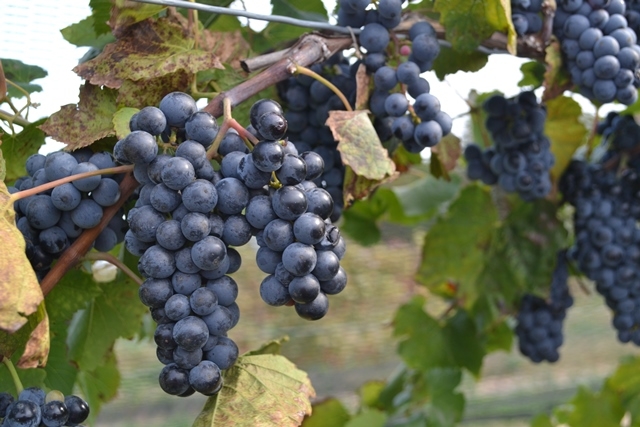
December 14, 2017, Vineland, Ontario – When Dr. Helen K. Fisher retired as viticulture research scientist at Vineland Research and Innovation Centre, there were a few loose ends to tie up.
Namely, what to do with her research on advanced wine grape selections for cold climate wine growing regions.
“Breeding work for wine grapes is a very slow process,” says Fisher. “Not only are you trying to find a plant that fits a climate, but it also needs to fit into a wine profile wineries are looking for.”
Vines can take up to four years to become established in the soil and produce quality grapes. To determine if the fruit fits a desired wine profile, it must be processed into wine, and then assessed after aging for three or more years.
“We’re looking for good quality reds that are tough in terms of agronomic potential and can withstand cold winters and wet growing seasons, that aren’t susceptible to disease or weather,” says Fisher.
Fisher says her work holds potential for larger Canadian wineries that want a sturdy but neutral wine that can be used for blending with other grapes. But to get meaningful results, the hybrids need more time. After retiring and losing access to land and laboratories, Fisher found new ways to continue her research.
“I was left with the dilemma of what to do with the plant material when it was at a stage that wasn’t even close to being presented to the public,” Fisher says. “Fortunately, Wes Wiens of VineTech Canada, a local nursery, donated land so the research could continue. It was tough land on a cold site – perfect, for my purposes.”
Fisher worked with the VineTech team to repropagate 40 plant selections from the VRIC property, based on genealogy and a superficial look at the most recent crop. She applied for funding through the Gryphon’s LAAIR Program and hired a summer student to collect data from the field. She also enlisted nearby Niagara College to make wine with the harvested grapes.
“Baco has had a good run in Niagara, but this is a chance to develop a new hybrid that offers a good amount of disease resistance and cold tolerance, perhaps with less acidity,” says Fisher.
Next, Fisher says project partners will test the wine quality, which she hopes to bring to two large wineries, to attract further interest and a long-term home for the research.
Print this page
